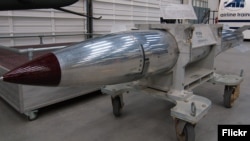U.S. B61 nuclear bombs are equipped with "permissive action links" or PALs, which prevent arming and using the weapon without an authorization code. They are kept on special racks, inside secure underground vaults, inside protected aircraft shelters, inside a heavily guarded area, surrounded by two layers of fencing, lighting, cameras and intrusion detection devices, on protected airbases.
But this particular airbase, Incirlik, is in southern Turkey. The Turkish commander of the base recently was frog-marched off in handcuffs after being accused of involvement in last month's failed coup against the government.
And that is the problem, says nonproliferation expert Jeffrey Lewis of the Middlebury Institute of International Studies at Monterrey, California.
"I think in the near term they are very safe," Lewis said of the bombs in an interview with VOA. "But there are no security measures that would be sufficient against a host state that is trying to seize them, so generally speaking, it is not a good idea to have nuclear weapons in a politically unstable country."
Although the July 15 military-led coup failed to unseat the government of President Recep Tayyip Erdogan, the authoritarian leader retaliated with a massive purge of the country’s military, judiciary, media and educational institutions.
World leaders have reacted with unease.
And so have experts in nuclear weapons policy.
"There are a lot of tough barriers, but incidents and accidents have a nasty way of happening," said Hans Kristensen, director of the Federation of American Scientists' nuclear information project.
Ensuring stability
According to Amy Woolf, a specialist in nuclear weapons policy at the Congressional Research Service, the U.S. has around 200 B61 bombs located around Europe.
"These serve not only to deter potential aggressors, but also as an important element in NATO’s cohesion," she states.
Up to 50 of those bombs are believed to be in Incirlik.
But those bombs basically in storage, Woolf says, as Turkey neither maintains nuclear capable aircraft nor allows the U.S. to permanently deploy its own at the base. Woolf points out that the stockpile is there for NATO in case "the fundamental security of any of its members were to be threatened."
U.S. defense policy expert Kori Schake at the Hoover Institution told VOA that removing the weapons from Turkish soil would send the wrong signal to the American ally.
"Countries that feel protected by the U.S. – Japan, South Korea, Turkey – have not developed nuclear weapons of their own," Schake said. Without that guarantee, she says, "the risk is that they might develop nuclear weapons of their own."
The other potential negative consequence of pulling out the weapons is that Turkey – which feels highly exposed by the upheaval in Syria and the Middle East overall – would develop alliances with Russia or even Iran.
"Even if Turkey does not have a lot in common with Iran, it might not have a lot of good choices if the U.S. were not seen as [its] guarantor," Schake said.
Time to move them?
But Lewis argues that Turkey’s Erdogan is much more concerned about political opposition than he is about having nuclear weapons on his soil.
"It’s not something Erdogan is bringing up," Lewis said.
Kristensen told VOA he agrees that there would not be any serious political ramifications if the nuclear weapons were moved out of Incirlik.
"I would say that the Turks’ perception of our support of Turkey does not come down to nuclear weapons in a bunker. It has to do with NATO conventional force, and there is a very active program for that," Kristensen said.
Currently, some of the planes that rotate through Incirlik in the war against terrorism are nuclear capable, but they are not designated for any nuclear mission.
Nevertheless, Kristensen said, given the political situation in Turkey and the fact that the base is less than 100 miles from the war zone in Syria, it might be time to consider moving the weapons.
"You only get so many warnings before something goes terribly wrong, and there are plenty of warnings in the region now," Kristensen said.






